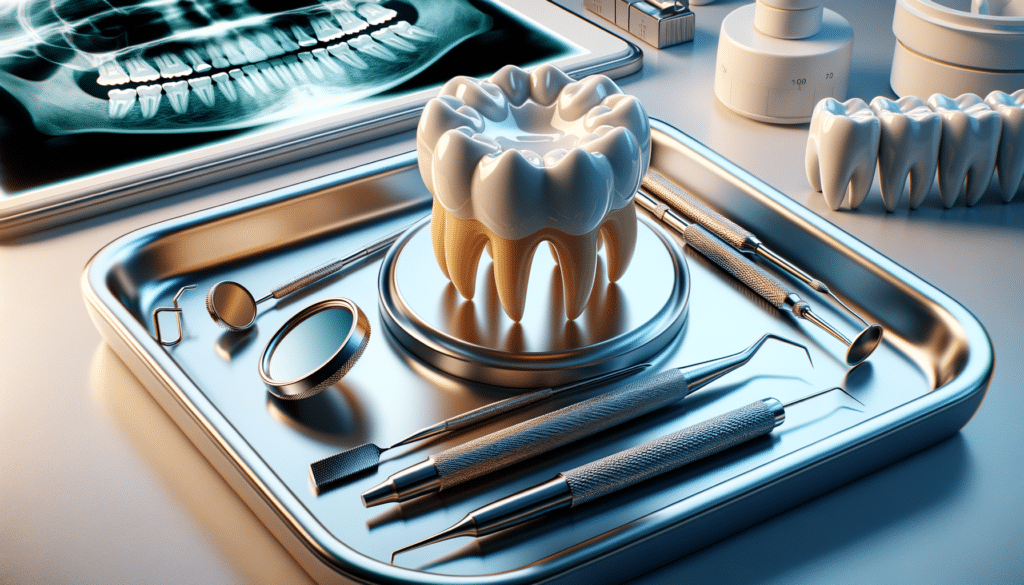Introduction to Dental Crowns
Dental crowns are a cornerstone of restorative dentistry, designed to cover and protect a compromised tooth. These dental restorations are crucial for maintaining oral health, offering both functional and aesthetic benefits. Dental crowns are often recommended when a tooth has been significantly damaged by decay, fracture, or after a root canal treatment. By encapsulating the affected tooth, crowns restore its shape, size, strength, and appearance. This makes them an essential option for preserving natural teeth and ensuring a healthy, confident smile.
Types of Dental Crowns
There are several types of dental crowns, each made from different materials, and each offering unique advantages. Understanding these types can help patients make informed decisions about their dental care.
- Porcelain Crowns: Known for their natural appearance, porcelain crowns are often used for front teeth. They are highly aesthetic and blend seamlessly with natural teeth. However, they may not be as durable as metal crowns.
- Metal Crowns: Made from alloys like gold or platinum, metal crowns are known for their strength and longevity. They are less likely to chip or break, making them ideal for molars that endure heavy chewing forces.
- Porcelain-Fused-to-Metal (PFM) Crowns: These crowns offer the strength of metal and the aesthetics of porcelain. They are a popular choice for both front and back teeth, providing a balance between durability and appearance.
- All-Ceramic or All-Porcelain Crowns: These crowns provide a highly aesthetic result and are metal-free, making them suitable for individuals with metal allergies.
- Resin Crowns: Generally less expensive, resin crowns are used as temporary solutions. They are not as durable or wear-resistant as other types.
The choice of crown material depends on several factors, including the tooth’s location, the patient’s bite, aesthetic preferences, and budget considerations.
The Procedure for Getting a Dental Crown
The process of getting a dental crown typically involves two visits to the dentist. During the first visit, the dentist examines and prepares the tooth that needs the crown. This may involve taking X-rays and filing down the tooth to make room for the crown. If the tooth is severely damaged or decayed, the dentist may need to build it up to support the crown.
Once the tooth is prepared, an impression is taken to create a model of the tooth, which is then sent to a dental laboratory where the crown is custom-made. In the interim, a temporary crown is placed to protect the prepared tooth.
During the second visit, the dentist removes the temporary crown and fits the permanent crown onto the tooth. Adjustments are made to ensure the crown fits comfortably and securely. The crown is then cemented into place, restoring the tooth’s function and appearance.
Benefits and Considerations of Dental Crowns
Dental crowns offer numerous benefits, making them a popular choice in restorative dentistry. They provide a protective cover for weakened teeth, preventing further damage and decay. Crowns also restore the tooth’s functionality, allowing patients to chew and speak properly.
In terms of aesthetics, crowns can improve the appearance of discolored or misshapen teeth, contributing to a more uniform and attractive smile. They also offer a long-term solution, with many crowns lasting between 5 to 15 years or longer with proper care.
However, there are considerations to keep in mind. Crowns can be expensive, and the process involves altering the natural tooth structure. Patients may experience sensitivity after the procedure, and in rare cases, the crown may become loose or fall off.
Maintaining Your Dental Crowns
Proper maintenance is crucial for the longevity of dental crowns. Patients should practice good oral hygiene by brushing and flossing regularly. It’s also important to avoid habits that can damage the crown, such as biting on hard objects or using teeth to open packages.
Regular dental check-ups are essential to ensure the crown remains in good condition and to address any issues promptly. Dentists may recommend using a night guard if the patient grinds their teeth, as this can wear down the crown over time.
Overall, with diligent care and regular dental visits, dental crowns can provide a durable and aesthetically pleasing solution for restoring damaged teeth.





